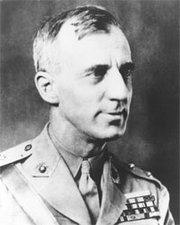Smedley Butler
|
|
Smedley Darlington Butler (July 30, 1881–June 21, 1940), nicknamed "the fighting Quaker" and "Old Gimlet Eye," was a Major General in the U.S. Marine Corps and at the time of his death the most decorated marine in U.S. history. Butler was twice the recipient of the Medal of Honor, one of only 19 to be so honored; he is noted for his outspoken left-wing views and his book War is a Racket, one of the first works describing the military-industrial complex. An immensely popular figure in the United States at the time, Butler led the Bonus Army and came forward to the U.S. Congress in 1933 to report that a failed coup had been plotted [1] (http://www.answers.com/main/ntquery;jsessionid=i9loc2s2gabd?method=4&dsid=2222&dekey=Business+Plot) by wealthy industrialists seeking to overthrow the government of President Franklin D. Roosevelt with the help of General Butler. This scandal is known as the Business Plot.
Butler was born in West Chester, Pennsylvania and was the Quaker son of Senator Thomas S. Butler. He attended Haverford College and was commissioned as a Second Lieutenant in the U.S. Marine Corps in 1898. He fought in the Philippine-American War later that year. In 1900 he received a brevet promotion to Captain for his action during the Boxer Rebellion (which brevet promotion qualified him to receive the Marine Corps Brevet Medal in 1921). Then in 1903, he fought to protect the U.S. Consulate in Honduras from rebels.
Butler was married on June 30, 1905 to Ethel C. Peters, of Philadelphia. From 1909 to 1912, he served in Nicaragua. Then in April of 1914, Butler earned his first Medal of Honor for the capture of Veracruz, Veracruz, Mexico during the U.S. occupation of Veracruz, Mexico (1914). On November 17, 1915, he earned his second Medal of Honor for the capture of Fort Riviere, Haiti. He received a Distinguished Service Medal in 1919.
In 1924-1925, Butler was loaned to the city of Philadelphia to serve as a police commissioner. His duty was to enforce Prohibition, a monumentally difficult task. Unlike many at the time, Butler insisted on enforcing the law against all violators, rich and poor, and this earned him both enmity and respect.
In 1927, Butler served a tour in China, and returned to the United States in 1929 as a Major General. On October 1, 1931, Butler retired from the Marines. In 1932, he ran unsuccessfully for the U.S. Senate.
Butler was known for his outspoken views against war profiteering and what he viewed as nascent fascism in the United States. His book War is a Racket holds a highly critical view of the profit motive behind warfare. Between 1935 and 1937, Butler served as a spokesman for the League Against War and Fascism, a leftist organization. He also spoke at times to the Communist Party of the United States of America. The following, from the Socialist newspaper Common Sense in 1935, is one of his most widely quoted statements.
I spent 33 years and four months in active military service and during that period I spent most of my time as a high class muscle man for Big Business, for Wall Street and the bankers. In short, I was a racketeer, a gangster for capitalism. I helped make Mexico and especially Tampico safe for American oil interests in 1914. I helped make Haiti and Cuba a decent place for the National city Bank boys to collect revenues in. I helped in the raping of half a dozen Central American republics for the benefit of Wall Street. I helped purify Nicaragua for the International Banking House of Brown Brothers in 1902–1912. I brought light to the Dominican Republic for the American sugar interests in 1916. I helped make Honduras right for the American fruit companies in 1903. In China in 1927 I helped see to it that Standard Oil went on its way unmolested.
The Camp Smedley Butler Marine Corps base on Okinawa, Japan is named in honor of Butler.
Smedley Butler died at Naval Hospital, Philadelphia, June 21, 1940. His doctor had described his illness as an incurable condition of the upper abdominal tract, presumably cancer.
See also
Sources and further reading
- Schmidt, Hans. Maverick Marine: General Smedley D. Butler and the Contradictions of American Military History. University Press of Kentucky: 1998. ISBN 0813109574.
External links
- Major General Smedley D. Butler, USMC (http://www.mclm.com/tohonor/sbutler.html) from the Marine CorpsLegacy Museum (http://www.mclm.com/)
- Smedley D. Butler Citations (http://www.cmohs.org/medal/history_links/s_butler.htm) from the Congressional Medal of Honor Society (http://www.cmohs.org/)
- Major General Smedley Butler USMC (http://www.rationalrevolution.net/war/major_general_smedley_butler_usm.htm)
- War is A Racket (http://lexrex.com/enlightened/articles/warisaracket.htm) by General Smedley D. Butler
- An American Coup d'État? (http://home.iprimus.com.au/korob/fdtcards/Butler.html) by Clayton E. Cramer. History Today, November 1995.
- The Business of War (http://coat.ncf.ca/our_magazine/links/53/butler-by_frazier.html) (an excerpt about Smedley Butler) by Wade Frazier
- Maverick Marine: General Smedley D. Butler and the Contradictions of American Military History (http://coat.ncf.ca/our_magazine/links/53/butler01-by_schmidt.html) (Excerpts dealing with some of his radical, post-retirement activities) by Hans Schmidt
- Camp Smedley Butler (http://www.mcbbutler.usmc.mil)

